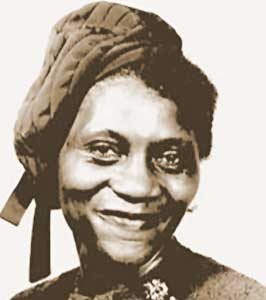
Special Collection
University of Nevada Reno Library
ALICE LUCRETIA SMITH
The information below has been compiled from a variety of sources. If the reader has access to information that can be documented and that will correct or add to this woman’s biographical information, please contact the Nevada Women’s History Project.
At A Glance:
Born: November 4, 1902, Bay St. Louis, Mississippi
Died: August 6, 1990, Reno, Nevada
Maiden Name: Alice Lucretia Smith
Race/Nationality/Ethnic Background: African American
Married: Alfred O. Smith, 1935, Oakland, California
Primary City and County of Residence and Work:
Reno (Washoe County)
Major Fields of Work: Community service, Helped organize National Association for the Advancement of Colored People.
Other Role Identities: Teacher, Volunteer with American Red Cross, Church Women United, Washoe County Economic Opportunity Board and other community groups.
One of Nevada’s early Civil Rights advocates and a humanitarian, Alice Lucretia Smith dedicated her life to helping others achieve their potential regardless of race or financial condition. She was a pioneer in improving understanding between the races. Born in Bay St. Louis, Mississippi to parents who were the children of slaves, she attended public schools and received her teaching credentials at Mississippi State University in Hattiesburg. Alice taught for several years, mostly in small towns close to the one in which she was born. Earlier, she had entered training to become a registered nurse, but had to quit to help her brothers and sisters get through school after their mother died.
She moved to Reno with her husband in 1938 and found work as a maid. Alice remembered that when she took up residence in Reno typically restaurant signs announced “No Colored Trade Solicited” or “No Negroes Allowed,” and even on one restaurant window, “No Indians, dogs, or Negroes Allowed.”
Together Alice and “Al” founded the Reno-Sparks branch of the National Association for the Advancement of Colored People in 1945. Before his untimely death in 1946, they were instrumental in founding the Robert H. Brooks Post of the American Legion for Black veterans, as Blacks were not allowed in other posts. Her husband was denied admittance twice to the Reno Veteran’s Hospital after he became ill. Finally, he was admitted but died soon after. Never allowing herself to become bitter, she told a newspaper reporter in an interview in 1978 that, “Instead of wasting time with that foolishness, I can do something constructive.” And true to her word, Alice Smith spent 50 years working for equality before her death in 1990.
Amongst her many honors were being chosen as Nevada delegate to the United Nations Conference in San Francisco in 1974; delegate to the President’s White House Conference on Aging in 1971; delegate to the Federation of the Blind Conference in Hawaii, being appointed to the State Welfare Board by Governor Mike O’Callaghan, as well as the State Advisory Committee for Older Americans, the State Advisory Board on Home Nursing, and the Nevada Foster Grandparents Board. She served as chairperson for the Economic Opportunity Board of Washoe County and was selected for “Who’s Who Among Black Americans” in 1975. That same year she was chosen as the “Woman of the Year” by the Sparks Business and Professional Women’s Club.
In 1976, an “Alice Smith Award” was established by the Community Services Agency. This award was presented to the board member who had contributed the most to the community during the year. She served for two years as chairperson of this Board. For twenty-five years she volunteered her time and energy to the American Red Cross in Reno and served as a member of their board of directors. Alice was a charter member of the Nevada League of Women Voters and also was active in her church, serving for three years as legislative chairperson for the northern Nevada and California organization of Church Women United. In 1966 she was the CWU delegate to the Race Relations Institute in Nashville, Tennessee. In 1972 Alice received the Service to Mankind Award from the Sierra Nevada District of Sertoma International. She was a member of the Democratic Central Committee, South Gate Chapter Order of Eastern Star, Berkeley, California, and Sparks United Methodist Church. An elementary school in Golden Valley, north of Reno, was named after her in 1989.
“Let’s not throw away our lives,” Alice said. “Let’s do something constructive. I always feel like I want to climb up a little bit, and maybe I can take someone with me.”
She was a woman who walked the walk to improve the lives of all people, was a leader in the fight against injustice and bigotry, and valiantly proved that one person can make a difference.
Researched and written by Kay Sanders.
Sources of Information:
- Woodard, Bertha A., “Alice Lucretia Smith,” NAACP Newsletter, April 27, 1988.
- “Outstanding Sparks Club, Business Women Honored,” Nevada State Journal, Nov. 7, 1975.
- “Alice L. Smith,” Who’s Who Among Black Americans, 1975-76 Edition.
- Sheila Caudle, “Black Leader Alice Smith Still Going Strong,” Nevada State Journal,
November 27, 1972. - “Service to Mankind Award Presented to Alice L. Smith,” Sparks Tribune, December 14, 1972.
- Smith, Alice, “Voices of Black America,” Bureau of Governmental Research, University of Nevada, Reno, 1971.
